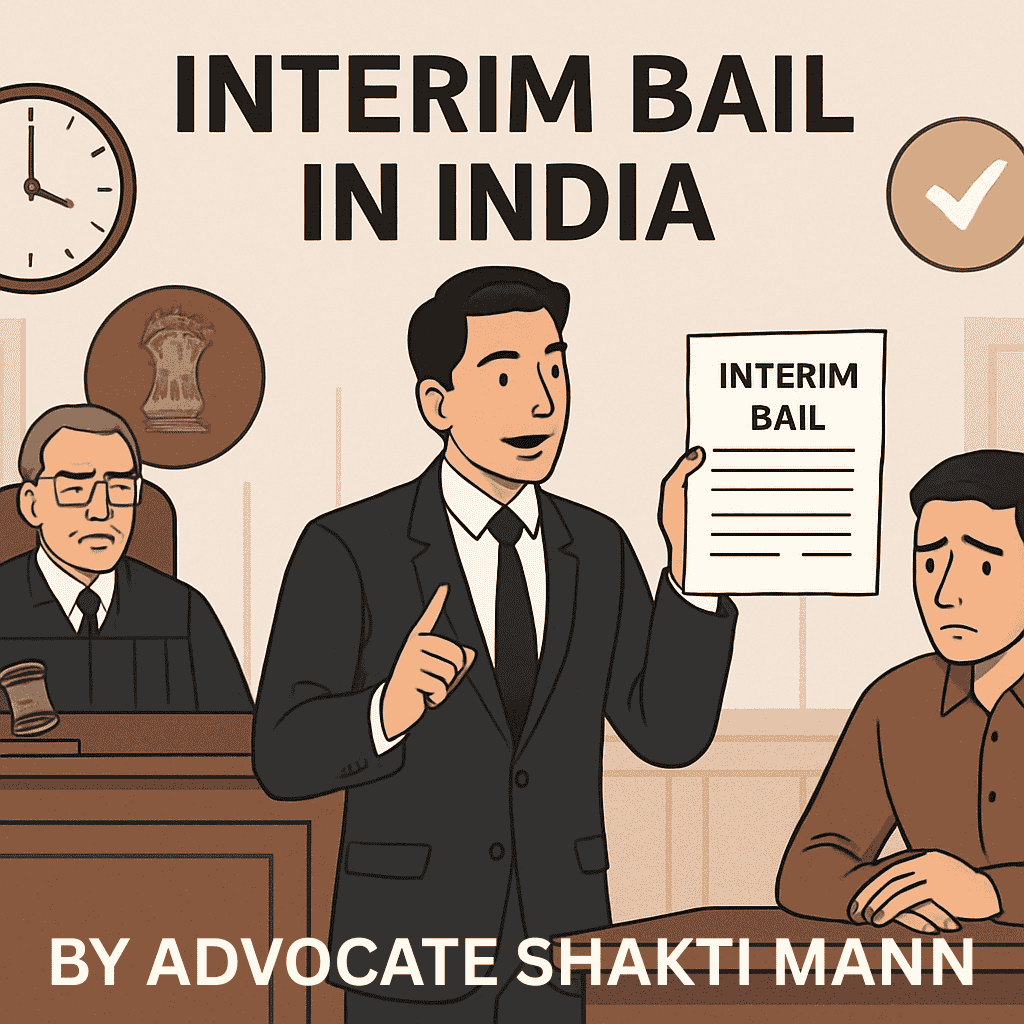Interim Bail in India

If someone is accused of a crime and is in police custody or under the fear of arrest, there are situations where they can get temporary relief from the court. One such relief is called Interim Bail.
In simple words, interim bail means temporary release from jail for a short period in urgent situations — until the court takes a final decision on regular or anticipatory bail.
When Can You Ask for Interim Bail?
You can apply for interim bail when:
- The court needs time to decide your main bail application.
- You have an urgent personal or family situation where staying in custody would cause serious problems.
- There’s a medical emergency involving you or your immediate family.
- There’s a death or serious illness in the family.
- There’s a vital responsibility that only you can handle (e.g., your child’s admission process, supporting a pregnant spouse, etc.).
It acts like a stop-gap protection given only for genuine and exceptional reasons.
Key Features of Interim Bail
- Temporary in nature – usually a few days to a few weeks.
- Can be extended – if the urgent need continues, you can request an extension until your main bail plea is decided.
- Ends automatically – if your main bail (anticipatory or regular) is refused and you don’t surrender.
- Can be cancelled anytime – if you misuse it or break conditions.
Why Courts Give Interim Bail – The Purpose
Courts grant interim bail to ensure:
- Your rights are protected – You are not unnecessarily kept in jail while the court decides your main bail.
- Your liberty is respected – Article 21 of the Constitution protects your right to life and personal freedom.
- Balance – The justice system does not harm your life or reputation if custody is not absolutely necessary.
Conditions for Interim Bail
Courts usually grant interim bail only if:
- They believe you will not run away.
- You will not influence witnesses or destroy evidence.
- You do not need to be interrogated in custody.
- You promise to cooperate with the investigation.
- You do not talk to the media about your case.
Grounds for Interim Bail Along With Explanations and Judgements
Let’s understand real-life situations where courts have granted interim bail so you can see how it works:
1. Medical Emergencies
If you or an immediate family member is seriously ill or needs surgery, courts can grant interim bail to let you help them.
- Example: In Yashpal Sinhmar v/s NCB (2022), the Delhi High Court granted 6 weeks’ interim bail because the petitioner’s wife needed spinal surgery and required his support.
- Another Example: In Jasbir Arya v/s State (2022), bail was given as the accused’s elderly parents suffered from serious illnesses and needed urgent surgery.
2. Death or Serious Illness in the Family
Courts understand family obligations, especially during bereavement.
- Example: In Priya Rajan v. State of Odisha (2021), interim bail was granted so the accused could perform his mother’s funeral rites after her death.
- Example: In Rajeev v/s State of Delhi (2022), one month’s bail was granted to care for his sick mother.
3. Family Welfare and Responsibilities
When no one else can handle urgent family or financial responsibilities, courts can allow short-term release.
- Example: In Nihal Ahmed vs State (2022), bail was granted so the accused could arrange payment for his daughter’s school admission.
These examples show that interim bail is not sympathy — it’s a legal right in genuine situations where your custody is not absolutely essential.
Can Interim Bail Be Cancelled?
Yes. If you break any of the conditions — like contacting witnesses, not appearing in court, or misusing the relief — the court can cancel your interim bail immediately. Getting it again after cancellation is very difficult.
Conclusion
Interim bail is meant to protect you from unnecessary detention in emergencies.
Remember:
- It’s temporary.
- It requires strong, genuine reasons.
- It’s granted at the court’s discretion, but you have the right to apply for it.
- Always have proof of your reason (e.g., medical reports, death certificates, school notices).
Knowing this can help an accused and their family take timely action and safeguard their liberty during a case.
